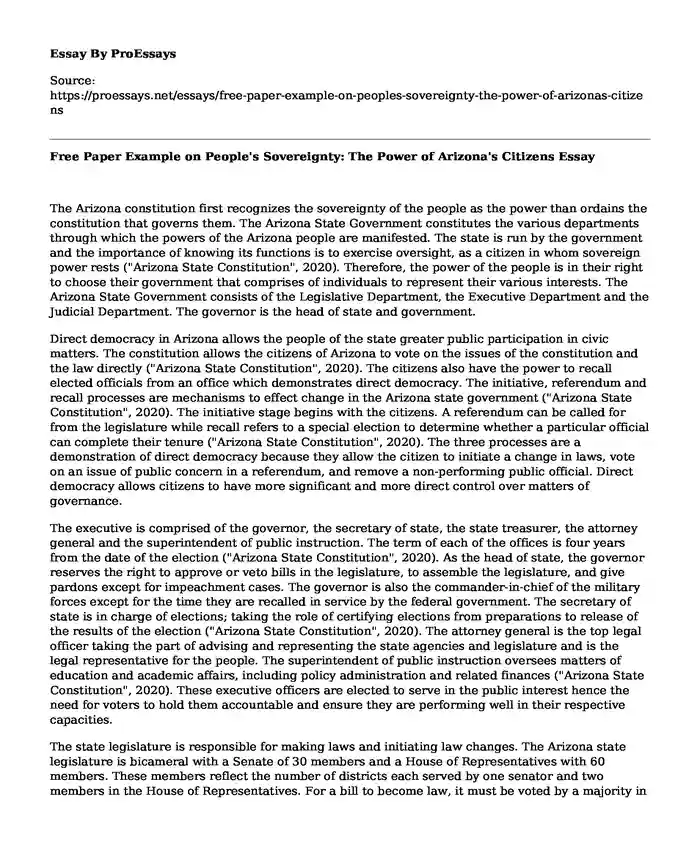The Arizona constitution first recognizes the sovereignty of the people as the power than ordains the constitution that governs them. The Arizona State Government constitutes the various departments through which the powers of the Arizona people are manifested. The state is run by the government and the importance of knowing its functions is to exercise oversight, as a citizen in whom sovereign power rests ("Arizona State Constitution", 2020). Therefore, the power of the people is in their right to choose their government that comprises of individuals to represent their various interests. The Arizona State Government consists of the Legislative Department, the Executive Department and the Judicial Department. The governor is the head of state and government.
Direct democracy in Arizona allows the people of the state greater public participation in civic matters. The constitution allows the citizens of Arizona to vote on the issues of the constitution and the law directly ("Arizona State Constitution", 2020). The citizens also have the power to recall elected officials from an office which demonstrates direct democracy. The initiative, referendum and recall processes are mechanisms to effect change in the Arizona state government ("Arizona State Constitution", 2020). The initiative stage begins with the citizens. A referendum can be called for from the legislature while recall refers to a special election to determine whether a particular official can complete their tenure ("Arizona State Constitution", 2020). The three processes are a demonstration of direct democracy because they allow the citizen to initiate a change in laws, vote on an issue of public concern in a referendum, and remove a non-performing public official. Direct democracy allows citizens to have more significant and more direct control over matters of governance.
The executive is comprised of the governor, the secretary of state, the state treasurer, the attorney general and the superintendent of public instruction. The term of each of the offices is four years from the date of the election ("Arizona State Constitution", 2020). As the head of state, the governor reserves the right to approve or veto bills in the legislature, to assemble the legislature, and give pardons except for impeachment cases. The governor is also the commander-in-chief of the military forces except for the time they are recalled in service by the federal government. The secretary of state is in charge of elections; taking the role of certifying elections from preparations to release of the results of the election ("Arizona State Constitution", 2020). The attorney general is the top legal officer taking the part of advising and representing the state agencies and legislature and is the legal representative for the people. The superintendent of public instruction oversees matters of education and academic affairs, including policy administration and related finances ("Arizona State Constitution", 2020). These executive officers are elected to serve in the public interest hence the need for voters to hold them accountable and ensure they are performing well in their respective capacities.
The state legislature is responsible for making laws and initiating law changes. The Arizona state legislature is bicameral with a Senate of 30 members and a House of Representatives with 60 members. These members reflect the number of districts each served by one senator and two members in the House of Representatives. For a bill to become law, it must be voted by a majority in both the House of Representatives and the Senate ("Arizona Law: The Legislative Process", 2020). After both chambers of the legislature take a final vote on the same bill, it is taken to the Governor who has the power to sign or veto the bill ("Arizona Law: The Legislative Process", 2020). The process of passing a bill begins with its introduction to both houses. The bill is read thrice on separate days before going to the committee stage. The committee can make amendments and bring them back to the legislature for discussion before the third reading when voting can be done ("Arizona Law: The Legislative Process", 2020). The bill must pass in both chambers before being sent to the governor. The governor is allowed five days to assent when the legislature is in session or up to ten days if the legislature is adjourned ("Arizona Law: The Legislative Process", 2020). The process of passing a bill must take place separately in both chambers and pass before being passed to the governor's office.
The Arizona state government is a government by the people. The leadership is put in place through elections by the citizens who entrust them with the power over their public affairs. It is essential to understand the functions of the state government to become informed voters and seek accountability of elected officials. The Arizona constitution gives the people of Arizona ultimate power as sovereign power rests on the people. The people can exert power indirectly through voting and directly through processes such as initiating for changes and recall. The constitutional knowledge on how to change a government is vital to citizens who become active in civic matters and can demand accountability of officials elected as stewards in public issues.
References
Arizona Law: The Legislative Process. (2020). Retrieved 30 August 2020, from https://libguides.law.asu.edu/ArizonaLaw/legislativeprocessArizona State Constitution. (2020). Retrieved 30 August 2020, from https://www.azleg.gov/constitution/
Cite this page
Free Paper Example on People's Sovereignty: The Power of Arizona's Citizens. (2023, Nov 23). Retrieved from https://proessays.net/essays/free-paper-example-on-peoples-sovereignty-the-power-of-arizonas-citizens
If you are the original author of this essay and no longer wish to have it published on the ProEssays website, please click below to request its removal:
- Liberty in United States
- Incarceration and Transitions to Adulthood among Urban Youth
- Essay Sample on Chinese Economy
- Paper Example on Comparing Art Design Culture in China and Malaysia
- Essay on Privacy & Security: A Closer Look at the Rights and Protections
- Esasy on Pros & Cons of Marijuana Use: A Debate
- Free Paper Sample on Transformation of China's Healthcare: A Critical Analysis of the 2009 Reform







